Peter MALONE
5 Frauen
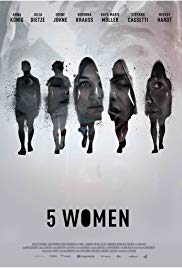
5 FRAUEN/ 5 WOMEN
Germany, 2016, 98 minutes, Colour.
Anna Koenig, Odine Johne, Kaya Marie Moller, Julia Dietze, Korina Krauss, Stefano Cassetti.
Directed by Olaf Kraemer.
Four women who have been friends for many years come to the south of France to enjoy a holiday in a farm owned by an older friend. The film gives some background to each of the women, though the owner has suffered some kind of trauma and the others are trying to support her. Everything seems idyllic for a holiday and a healing of past memories.
However, one of the women is late, encounters a stranger swimming in the lake, succumbs to a sexual encounter. The man later arrives, seems attractive to most of the women, says that he is looking for his brother. In the meantime, the audience has seen roadblocks and police searching for robbers.
With the coming of the man, and the attraction for the women, some conflicts arise amongst the women themselves. This is complicated by the intrusion of another man, the revelation about the two brothers.
However, the owner of the house, who has had an experience of sexual trauma, is also attracted to the man – but, this leads to violent consequences.
The film is strong in its presentation of its themes, moves into darker aspects of human nature.
Secret of the Blue Room
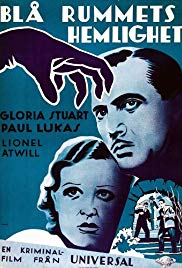
SECRET OF THE BLUE ROOM
US, 1933, 66 minutes, Black and white.
Lionel Atwill, Gloria Stuart, Paul Lukas, Edward Arnold, Onslow Stevens, William Janney, Robert Barrett, Muriel Kirkland, Russell Hopton, Elizabeth Patterson.
Directed by Kurt Neumann.
This film is based on a German novel and original screenplay by Eric Philippi. It was remade in 1938 as The Missing Guest and again in 1944, with some song and dance routines, Murder in the Blue Room.
This is a brief murder mystery with a twist. It is set in a mysterious house – with mysterious doors and secret staircases. It opens atmospherically with a birthday party for Gloria Stuart (64 years before Titanic) who also has a song. Stories are told about murders in an upstairs room, the Blue Room, which has been shut since.
The young woman has three possible suitors. One of them, William Janney, offers to sleep in the blue room – and the next morning, he has disappeared. Another suitor, Onslow Stevens, offers to sleep there the next night and is found shot dead.
The servant of the house, Robert Barrett, seems to be signalling to a stranger outside the house. The owner of the house, Lionel Atwill, seems to be behaving strangely and suspiciously. Finally, the third suitor, Paul Lukas, offers to stay the night in the room. However, they have called in the local police, a rather sombre and dictatorial Edward Arnold. There is a shooting – but they have set up a dummy, have found the secret passage and arrest the original suitor who had set up the whole situation to get rid of his rivals.
There are also explanations about the mysterious stranger being the brother of the owner and the father of the young woman.
Standard material but a strong cast.
Black Doll, The

THE BLACK DOLL
US, 1938, 66 minutes, Black-and-white.
Donald Woods, Nan Grey, Edgar Kennedy, C.Henry Gordon, Doris Lloyd, Addison Richards, Holmes Herbert, William Lundigan, Fred Malatesta.
Directed by Otis Garrett.
The film is an interesting murder mystery and there are quite a number of twists. There is a discussion of the opening with the view of the man to be murdered is after money, check from his uncle, indulged by his mother. He obviously will be one of the suspects. However, the focus is on the rich man, who discovered mine in Mexico, splitting money with his partners, but one of them disappearing, possibly killed. The murdered man has a daughter and it was her black doll which lead to the discovery of the mine.
The doll appears on the desk of the murdered man. And he summons his two partners he has not seen in years. Two more suspects.
The daughter is present when her father is killed but collapses.
Most of the film is taken up with the interviews, some of twists, a most inept sheriff, rather irritating for the audience because of his stupidity, but the young woman’s boyfriend who has detecting skills (Donald Woods) feeding ideas to the sheriff and ultimately solving the case.
There are Hispanic servants, the local doctor who has a relationship with the dead man’s sister (and it becomes evident to most audiences well before the end that he is the murderer.)
Invisible Killer, The
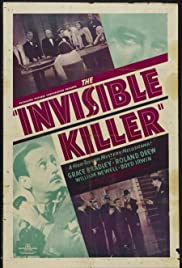
THE INVISIBLE KILLER
US, 1939, 63 minutes, Black-and-white.
Grace Bradley, Roland Drew, Jeanne Kelly.
Directed by Sam Newfield (as Sherman Scott).
This is a routine murder thriller, rather enjoyable in its slight way. It was directed by the prolific Sam Newfield, director of many such films, but using the pseudonym Sherman Scott to avoid giving the impression that he was directing too many films!
The film focuses on the police investigating murders. There is also a very active newspaper reporter who is engaged to the police investigator but who also frustrates him much of the time.
The issue is the city’s gambling, powerbrokers of gambling, the casinos, the Mr Bigs behind-the-scenes as well is a criminal who is ready to testify and who is killed. The district attorney’s office is also concerned.
Familiar banter between the central couple, familiar interviews and police activity. The difference with the film is that poison is put into the receivers of the telephones, giving more mystery to the deaths and the investigation.
Paint Me a Murder
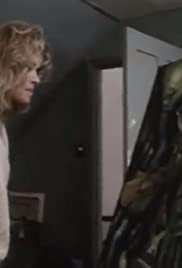
PAINT ME A MURDER
UK/US, 1984, 70 minutes, Colour.
Michelle Phillips, James Laurenson, David Robb, Alan Lake, Morgan Sheppard, Mark Heath, Michael Watkins, Michael Mc Kevitt, Gerald Sim.
Directed by Alan Cooke.
This television film was part of an anthology, Hammer House of Suspense, released in the United States as Fox Mystery Theater. There were British and American directors, Alan Cooke starting his career in the UK and finishing directing American television. There was also a mix of British and American cast, with locations in the UK.
The American star in this film is Michelle Phillips, best known for the Mamas and the Papas, not for her acting performances. New Zealand born James Lawrenson is the central character of an artist, intent, wanting fame rather than money, engineering his death in a rowing boat, hiding in the attic of his house, continuing painting, his wife contacting art dealers and selling the paintings one by one, his reputation gaining in the media, amongst art dealers, amongst buyers in the UK and even in the US.
Nothing particularly new. James Laurenson paints a number of pictures of his death, is anxious to get out the attic. His wife, on the other hand, enjoys the contacts with the art world, the money – and had masterminded the whole plot. There is an art dealer, played by David Robb, who is selling the paintings but is attracted to the wife.
There are some old painting friends who put in their two pennies worth, there are police officers, and there is another rather snooty art critic on the scene.
The wife decides to buy arsenic as rat poison but feeds it to her husband (and the pigeons who are in his loft). She makes plans with the art dealer. The artist gets out, smashes the window of the shop and damages the painting, drives to Battersea and paints a mural, is persuaded to go to the holiday house (near ultra-convenient cliffs) and hide out there and continue his painting. It is inevitable that there will be a struggle on the top of the cliffs – and no surprise as who survives!
Frank & Lola

FRANK & LOLA
US, 2016, 88 minutes, Colour.
Michael Shannon, Imogen Poots, Justin Long, Rosanna Arquette, Michael Nyqvist, Emmanuelle Devos.
Directed by Matthew Ross.
The pairing of Michael Shannon and Imogen Poots is quite unusual, but that is the nature of the relationship explored in this film. Michael Shannon is Frank, an older man, trained as a chef in Paris, a strong reputation in Chicago. Imogen Poots is Lola, graduated as a fashion designer, looking for a job, entering into a relationship with Frank. At first hesitant, then the couple living together, having a meal with Lola's mother (played by Rosanna Arquette).
Also on the scene is Justin Long as a millionaire owner of stores who float at a bar with Lola but offers her a job. He hires Frank's company to cater for a dinner where Frank discovers that Lola is a guest. Keith also offers Frank the opportunity to go to Paris for a cooking audition at a mansion.
Complications come when Lola has a one night stand, is tearful, explains that she has been raped in the past by her mother’s boyfriend in Paris. This adds to Frank's obsessive approach to Lola.
In France, Frank tracks down the mother's boyfriend, they share a trip to a seedy sex club, Frank finally revealing his relationship with Lola, talking with the man's wife. The couple are played by Michael Nyqvist and Emmanuelle Devos .On his return to Chicago, Frank finds that the man is there, contacting Lola and there is a brutal fight.
Ultimately, Frank gives an ultimatum to Lola returning and not seeing her but the audience seeing her in the background at the bar. The ending is ambiguous.
1. Billed as a psychosexual drama? How interesting? Effective?
2. The Chicago settings, restaurants, the streets, apartments? The contrast with the Paris settings? Mansions, kitchens? Seedy clubs? The musical score?
3. The total, the focus, expectations?
4. The opening, the initial relationship between Frank and Lola, sexual, visitations, Lola and her being forward, Frank and his hesitations?
5. The development of the relationship? Together, the dinner with Lola’s mother, Frank defending Lola about her mother being condescending?
6. Frank, his age, training as a chef in Paris, cooking for many years, his reputation and skills, Centre working in the restaurant, working for owners, his being employed to
cater for meals? Issues of restaurants, ownership? His progress?
7. Lola, fashion design, relationship with her mother, her mother's boyfriend in Paris, the story of the rape? Her graduation, the link with Frank? The encounter with Keith, the talk about the job, his owning the stores, Frank and his listening in, jealous? Lola going to work for Keith, but not with him? The domestic scenes at home? Frank and his questions?
8. Catering for the dinner, being brought in to meet the guests, the irony of Keith being the host, the surprise to find Lola there, her going to the kitchen, talking? Keith and his offering the opportunities for Frank to audition in cooking in France?
9. Frank, the car, waiting for Lola? Her tears? Frank being upset, demanding, impatient? Lola and explanations about the mother's boyfriend, the rape? The effect on her? The one night stand? Frank's growing obsessive attitude?
10. Frank going to Paris, the connections, the dinner, the acclaim? His staying in Paris, connections, tracking down Alan, the drinks, the tour of the city, going to his apartment? The scenes of the sex video and Lola's presence and activities?
11. The background of the club, the women, sexual activities and fantasies?
12. Alan, Claire, the relationship, Frank and his contact with Claire, the discussions?
13. Frank, the knife, confronting Alan about the rape? His denials?
14. The return to Chicago, the interview with Claire and her husband's explanation of his travels? Frank finding him in Chicago? With Lola? Frank assaulting him, the fight? Ordering Alan out of the US?
15. The dinner, Keith, Lola, the discussions with Frank? His catering, his going to change, an ultimatum for Lola? His return, not seeing her at the bar, yet the audience seeing her in the background?
16. The ambiguity about the ending, a future together, not?
Jawbone
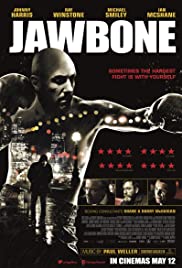
JAWBONE
UK, 2017, 91 minutes, Colour.
Johnny Harris, Ray Winstone, Michael Smiley, Ian Mc Shane.
Directed by Thomas Napper.
This is a very strong boxing film. It was written and directed by actor Johnny Harris who takes the central role. Clearly, the character and themes were important for him.
One of the themes is that of the young prodigy who excels at something, this time being a boxing champion. However, there is a collapse, wins and losses, alcoholism. The carrot, Jimmy Mc Cabe, has lost his mother to whom is devoted, still lives in her flat but it is threatened by the local Council for demolition.
Jimmy returns to the gym, making contact with his previous trainer, Bill (a strongly typical performance by Ray Winston) and some supervision from a coach, Eddie (also a strong performance by Michael Smiley). Jimmy goes into training, makes contact with an entrepreneur, Ian Mc Shane, is promised about in an unlicensed fight in the North.
Jimmy goes for an AA meeting but does not admit his situation publicly. Bill has terminal cancer which, in moments of friendship, he reveals to Jimmy. Jimmy has a confrontation with Eddie, denouncing them in public, later apologising, with Eddie accompanying him to the north for the about.
While there is harsh realism in the plot and in the visual treatment, the film is ultimately hopeful, possibilities for redemption, and an affirmation of AA.
1. A significant boxing film? Human drama? Success, low ebbs, alcoholism, fight back? Friendship and support?
2. The London settings? The river, streets, overpasses? Apartments? Government offices? The gym? The back rooms? The restaurant and the entrepreneurs? Going north, the arena, the match? AA meetings? The musical score?
3. Johnny Harris producing, writing, performance? Heartfelt?
4. The portrait of Jimmy Mc Cabe? First sight, down and out, drinking, the apartment and eviction, mourning the death of his mother, going to the office, his causing a scene, the reaction of the officials, the manager and the discussion and her explanations? Angry yet always polite? Going to the gym, reuniting with Bill, resuming his training, the conversations with Bill? Memories of his achievement when young, champion at 16, achievement at 22? The audience not knowing what really happened to him to lead to the alcoholism?
5. His going to the AA meeting, the welcome, the prayer, the reading of the welcome? His not admitting to the visit? His promise to Bill that he would not drink? His climbing into the gym windows, staying there? The compliment that Bill could reveal his secret to Jimmy?
6. Joe, swank, the restaurant, the steak, the possibility for the fight, unlicensed, the brutality? Jimmy accepting it?
7. The discussions with Eddie, his outburst against Eddie, Eddie telling him off, Eddie apologising to the other boxers? Jimmy later desperately apologising?
8. Going north, the fight, Eddie accompanying him, encouraging him? The crowd, hostility towards Jimmy? The choreography of the fight, the opponent being brutal, Eddie urging Jimmy to box rather than fight. Ultimate success? The knockout? (And the fee and the extra for the knockout?) Jimmy leaving the ring?
9. The aftermath, the previous temptation to drink again, going to the AA meeting, introducing himself?
10. The gritty drama? A story of potential for redemption? For relying on talent?
Gunpowder

GUNPOWDER
UK, 2017, 175 minutes, Colour.
Kit Harrington, Peter Mullan, Liv Tyler, Derek Riddell, Sian Webber, Robert Emms, Thom Ashley, Shaun Dooley, Mark Gattis.
Directed by J Blakeson.
Television audiences havehad the opportunity to look at the Reformation and the tensions between Catholics loyal to Rome and those wanting to break from Rome in Wolf Hall. The subsequent history has been seen in the many films focusing on Elizabeth I, particularly Elizabeth and its sequel, starring Cate Blanchett.
This production, seen initially in three episodes for television, takes up the Catholic and Protestant tensions subsequent to the death of Elizabeth, and the accession of James I and the Stuarts to the English throne. Elizabeth died in 1603.
James I appears in Gunpowder but the focus is very much on Catholic rebels, particularly Kit Harrington as Sir Robert Catesby sounding out fellow Catholics, preparing military action against the king, going into action and losing. But this is also the story of the Gunpowder plot, Guy Fawkes and his associations with the Catholics, the plan to blow up the parliament.
The film also focuses on the Jesuits and their presence in England at the time, still functioning, but more and more persecuted, even tortured (presented vividly here). There is also the story of the Recusants and their having masses celebrated in their homes, and the priest holes where the clergy could be concealed. There is a particular focus on Father Henry Garnet, played effectively by Peter Mullan, Superior of the Jesuits, ultimately arrested, tortured and executed. In the background is also the story of Father John Gerard, a supporter of the Gunpowder plot (but somewhat fictionalised in this version).
Mark Gattis is particularly sinister as Lord Robert Cecil, determined to crush the Catholics.
1. The title? Audiences knowing about British history and the Gunpowder Plot of the 17th century?
2. British history, the 17th century, the end of the reign of Elizabeth, James I? The role of the Cecil is in these rains? Religion, Protestantism, Catholics, the Jesuits, anti-Catholic stances, torture, the rack? Execution, hanged, drawn and quartered?
3. The period, costumes and decor, the locations, the royal palace, mansion’s, homes and hiding halls, Jesuit refuges, Catholic meeting places, the streets, torture the rack, the gallows? The musical score?
4. The introduction, the family at Mass, Father Garnet, communion, the Jesuits present? The attack by Wade, the soldiers? The hiding holes for the priests, the closet, the sofa? The servants tidying the house, the bed, the vessels…? The family and the stances? Thomas, young and earnest? Anne, standing proudly? Lady Dorothy Deepdale, in charge, taking responsibility? The role of the servants? The search, lady Dorothy Stoic, applications of the law? Knocking on the closet doors, Daniel Smith and his seeing the risk for father Garnet? His surrender, arrest? Lady Dorothy and her arrest? The treatment, on the gallows, humiliating her by stripping her, the stones and the weight crushing her? The antagonism of the crowds, the hatred? Thomas and and watching?
5. The King, succeeding Elizabeth, his rule, personal manner? Issues of the law, his advisers, the issue of Spain and the treaty, those favouring the treaty, Cecil and his staff, Wade, trying to undermine the negotiations? Meetings and discussions?
6. Cecil, his manner, his stooped, sinister, his father in Elizabeth’s time? Politics, scheming? You his use of Wade?
7. Thomas Catesby, devout Catholic, becoming fanatical? The death of his wife, the treatment of his son, blaming him, the later reconciliation? His relationship with an?
8. Cecil, the arrest of Smith, the torture, the grim execution, his head on a pike? In regard it, the Jesuits, in hiding, his being calm, the drinking of the wine, the ticket for do a four Smith, it is being taken, the investigation? The differences with John Gerard? Thomas coming for confession, the plot, the sea with confession? Garnet disagreeing, not revealing the truth? His arrest, treatment in prison, Cecil visit, the glass of wine? The interrogation, no information, prison, death of the gallows?
9. The persecution, the refugees into a, the Requisite Catholics? Lord Stanley and his stances?
10. Spain, the Catholic atmosphere, the possibility of the treaty, the political implications, trade implications? The constable and his negotiations, advisers? Thomas and John going to Spain, the audience, trying to persuade the constable? The Spain is going to the United Kingdom, meeting with the King? Their being used, meetings and betrayals? The finale, the king, Cecil, the treaty?
11. The character of guy Fawkes, working with Stanley, the assassinations, his identity is, a character? Meeting with Thomas and his friends? The pledges, the plan, raising troops around the country from the estates, fanatical Catholics? Thomas and his confession? John Gerard and his attitude, supporting the plot (and is not being in fact factual)?
12. Cecil, interrogating Thomas’s son, getting the information about Spain? The interactions with Anne, her defying him? Her escape with the son?
13. The scenes of torture, the rack, Cecil present and watching?
14. His dealings with the Spaniards? Concessions and deals? Surviving?
15. The plan, the gunpowder, collecting the gunpowder, and a Parliament house, the setup? The information, the arrests, the failure of the plot?
16. The battle, the fighting, the deaths, Thomas and his confrontation and being shot? The heads on the Pikes?
17. A sober look at an aspect of British history?
Jane Fonda in Five Acts
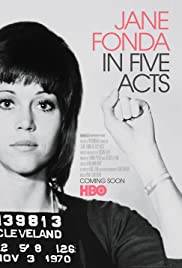
JANE FONDA IN FIVE ACTS
US, 2018, 133 minutes, Colour.
Directed by Susan Lacey.
This is a very interesting portrait of a significant American of the 20th century. The five acts in the title focus on Jane Fonda’s father, actor Henry Fonda, and her three husbands, Roger Vadim, Tom Hayden, Ted Turner, and then a final act with the take title, Jane.
The basis of the film is interviews with Jane Fonda, mostly simply in a room with the interviewer, but also visiting scenes from her past, the boarding school where she was happy, her mother’s grave… And, there are many clips from her films, situating them in her life context, as well as many clips from home movies, television news…
The audience will not have a favourable impression of Henry Fonda as a father from this film, his treatment of his wives, his distance from his children, the suicide of his wife, Jane and Peter Fonda’s mother. In his films, he was the embodiment of the American everyman. However, there are moments of reconciliation when the father and daughter appeared in On Golden Pond, some of the aspects resembling real life.
The film gives Jane Fonda the opportunity to assess and reassess her life and its meaning is. Lacking in self-confidence when she was young, emotionally neglected by her parents, she ventured out into acting on stage and in early comedy films, moving to France, encountering Roger Vadim, appearing in his films, especially Barbarella, giving birth to her daughter, Vanessa.
However, by 1968, she was very conscious of American action, especially in Vietnam, and, while she made films after returning to the United States, she began to join in the protest movements, eventually visiting Hanoi, which brought enormous hostility from Richard Nixon and the American public. Yet, at the same time, she won an Oscar for Klute.
Her marriage to Tom Hayden was a mixture of love and politics, giving birth to her son, Troy, their activities life, communal concern, political issues, two different lives and worlds, and their separation. It is interesting to note that the origin of her aerobics video on books was to raise money for their social organisations.
Then another extreme, marriage to Ted Turner, her becoming involved, especially after their separation, in women’s issues and her becoming a feminist, discovering herself in the 21st century.
In addition, there are quite a lot of interviews and talking heads.
1. The standing of Jane Fonda? Her life and career? The social causes? At almost 80? Audience interest in her, knowledge of her life and career?
2. Interviews at age 78, her skill in telling her story, her honesty, raising the issues, of her family background, of being considered spoilt, her work as an actress, her personal development, her husband’s, the Vietnam War, her reputation, protests, subsequent courses? Her living through the complexities of American life in the 20th century?
3. The clips of the interviews, the visuals of her plays, of the films over the decades? A portrait of Roger Vadim, of Tom Hayden, of Ted Turner? Her life in France and films in France, Barbarella? Becoming more serious, They Shoot Horses, Don’t They, her background work for Klute and the prostitutes, the reality of Vietnam veterans in Coming Home? Her protests, the adverse comments of Richard Nixon? Her continued causes despite the American public, the development of the aerobics video, the books? The finances for her causes? 9-to-5 and the concern for women, equal pay and opportunity? Her later films and her television series during her 70s? Her impact as an actress?
4. The family background, Henry Fonda and his reputation, the glimpse of his films, considered an upright character? His marriages and affairs? Jane and Peter, their mother? The picnic photo and her explaining the symbolism, her father looking into the distance? Her loneliness as a child, her father unable to express feelings? Her mother, her behaviour, Jane not able to relate to her? The support of Peter? Her mother’s death, not being told the truth – the later discovery of the truth, and eventually looking at the institution records, understanding of illness, visiting her grave? Her memories of her mother in the sequences of talking about the birth of Vanessa? Her going to boarding school, her delight, finding friends, studies?
5. Her personal story, self-image, self-confidence and lack of it, the Lux advertisement, the discussion about her plays on Broadway, the early movies, her family, moving to France, a new life, her descriptions of Roger Vadim, the marriage, her memories of Barbarella, giving birth to Vanessa and the subsequent experience, change, leaving Vadim?
6. The American attitudes, the Vietnam war, the protests of Simone Signoret and the contact, beginning to think for herself, 1968, the war, student riots in France? The protests, her visit to Hanoi, the visuals of the visit to Hanoi, with the soldiers, with the prisoners of war, her reactions, later assessments and regrets? This setting the course for her future life? And the background of preparing for Klute, her Oscar?
7. The meeting with Tom Hayden, his being interviewed for this film, in himself, his political background, causes, the bond between the two, the separate lives, the birth of Troy, Hayden saying he was not a Hollywood person, the contrast with Jane? The parting of the ways? The photos, Vanessa present but sometimes obscured, her not being interviewed for the film, but the photos with her mother and her children?
8. The causes, living poor, the camps for children, her wanting to contribute, restaurant, her aerobics, one camera, the video, the book, the record sales, on the New York Times book list the years? Her reflections on what the aerobics did for women and their self-image, as well as for herself?
9. Her father’s reaction to her and her career, against her being a communist, her staying with him at various times? The background of On Golden Pond, her reflections on making it, the scenes with him, the parallels with their lives, his tear, not able to express emotions? Her accepting the Oscar on his behalf?
10. The encounter with Ted Turner, the description of him, making him wait, their outings, the exhilaration, the marriage, her life with him, not CNN, the ranch, the horses, yet his more permissive behaviour, her decision to leave, not being able to be her true self? Yet his being her favourite ex-husband?
11. 9-to-5, her feminist self, supporting women, the range of protests and causes? Her later career, with Lily Tomlin and her comments?
12. The effect of her being able to go back over her life, assess it, reassess it, reconciling with her life – and her hopes and ambitions for her 80s.
Jappeloup
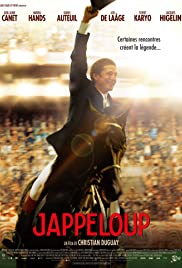
JAPPELOUP
France, 2013, 130 minutes, Colour.
Guillaume Canet, Marina Hands, Daniel Auteuil, Lou de Laage, Tcheky Karyo, Jacques Higelin, Marie Bunuel.
Directed by Christian Duguay.
This is a film aimed specifically at the French audience. Many will know the horse concerned, jockeys and trainers, the competitions, European Cups, the 1984 Olympics, 1988. For non-French audiences, it will be of interest but will not have the same emotional impact as, for instance, Secretariat, Seabiscuit.
The title of the film refers to the horse and there is a focus on the horse, young then mature, training, owners, bonds with riders.
The film also has a strong cast, led by Guillaume Canet as rider, Pierre Durand, bonding with the horse, but having difficulties with his father, played by Daniel Auteuil, supported by his mother, Marie Bunel, leaving the horse behind and going into work in an office. However, he is later persuaded to return to riding, especially influenced by Nadia (Marina Hands), who bonded with him when they were young. The latter part of the film shows his training, his determination to win, overcoming barriers, especially in his own psychology and attitudes. The climax of the film is at the Olympics, 1984, 1988. Tcheky Karyo plays the trainer, often clashing with Pierre.
The director is Canadian, has directed a lot of action films but also some films with humane sensitivity, especially in the Belle and Sebastien series.
1. A racing story? Forces? Dressage? Competition?
2. A French story, a champion French horse, writers and performers, training, success and failure, European Cups, 1984 Olympics, triumph in 1988?
3. The title, the focus on the horse, its birth, Dalio and his wanting it for his daughter, her failure with the horse, Serge and his interest, Pierre and taking it over, Raphaella and the training, Nadia and the writing in support, Pierre and his writing, training, not caring for the horse as much as he should, in competition, in crisis situations, especially the fire in the van, the ultimate achievement?
4. The Durand and family, Serge and his forces, training, the support of his wife? Pierre, his ability to ride, falling but getting on the horse again? Growing up, deciding to study law, his work? Returning after some years, the expectations of his father? Encountering Raphaella, Dalio, the horse? Nadia writing? Falling in love with Nadia, marriage, the birth? Father?
5. His returning to riding, his skills, the competitions, failing, not hearing the bell and being disqualified, his tantrum? The interactions with Raphaella and her dissatisfaction with his riding and treatment of the horse? In competition, successes and failures? The coach and the clashes with him?
6. The preparation for the 1984 Olympics, coach, achievement, but failure?
7. Pierre, the death of his father and its effect? The continued support of his mother? Nadia?
8. In the French team, the criticisms of the coach, his personality, techniques? Going out on his own, the request an interview for winegrowers support and sponsorship?
9. The coach giving up? Pierre’s antagonism towards the coach’s son and the bad measurement in the competition? Reflecting on the French team?
10. The new coach, Pierre going back on the French team, the preparation for the 1988 Olympics? The episode with the fire in the van, the horse and its panic, Pierre soothing it?
11. The dramatic buildup of the film, everybody in support, Pierre’s performance, the achievement, the medal, support?
12. The popularity of this kind of sporting film, animal achievement, human achievement?